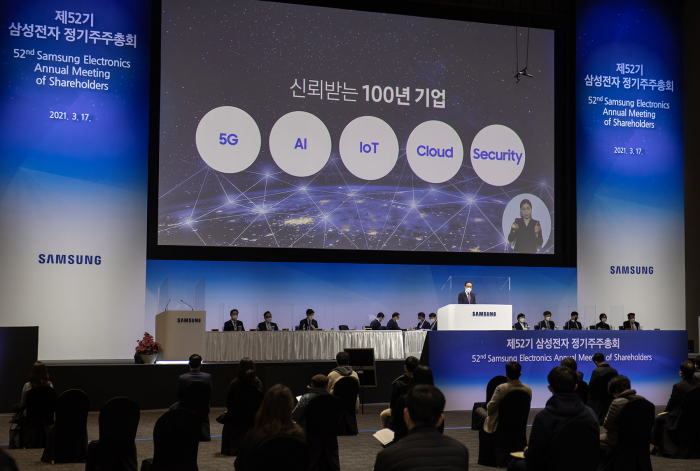Samsung says to overtake TSMC with efficient, right-time investment
Mar 18, 2021 (Gmt+09:00)
LG Chem to sell water filter business to Glenwood PE for $692 million


Kyobo Life poised to buy Japan’s SBI Group-owned savings bank


KT&G eyes overseas M&A after rejecting activist fund's offer


StockX in merger talks with Naver’s online reseller Kream


Mirae Asset to be named Korea Post’s core real estate fund operator



Samsung Electronics Co. will make efficient and right-time investments to achieve economies of scale so that the world's largest memory chipmaker will become the top player in the foundry market as well, currently led by Taiwan Semiconductor Manufacturing Co. (TSMC), its senior executive said on Wednesday.
The supply and demand of chips is in a "serious imbalance" and will likely put a dent on Samsung's smartphone production from the second quarter, Kim Kinam, vice chairman and CEO of Samsung's device solutions division, told its annual general meeting (AGM).
"The two most important things, from our major clients' point of view, are how competitive we are in advanced technologies and whether we can supply products on a stable basis," he said during the AGM attended by around 900 individual shareholders, more than double last year's attendance.
"To make up for our weakness in production capacity and number of clients, we will make efficient investments at the right time."
Samsung has been ramping up its foundry business to challenge TSMC. In January, it clinched its first order from Intel Corp. to manufacture Intel-designed southbridge chipsets, which are installed on the computer motherboard and control all of the computer's input and output functions. At the time, TSMC took a production order for graphics processing units (GPUs) from Intel.
According to market tracker TrendForce, Samsung is the world’s second-largest foundry player with an estimated market share of 18% in the first quarter of this year. That’s well below TSMC’s estimated 56%.
As part of an effort to overtake TSMC, Samsung is seeking to secure as many extreme ultraviolet (EUV) scanners as it can. The EUV scanner uses lithography technology to draw elaborate and detailed patterns on semiconductor wafers. Samsung currently has 25 EUV scanners, about half the quantity owned by its bigger rival TSMC, according to industry sources.
CHIP SHORTAGE
But every morning, the tech heavyweight's workers and executives put their heads together to solve the components shortage problem, said Kim.
"In the IT industry, the supply and demand of chips and relevant components is in a very serious imbalance. It will likely affect our production from the second quarter," he said, in response to an individual investor's question about the business impact of chip shortage.
After a larger number of retail investors aggressively purchased blue chips such as Samsung Electronics in the pandemic-hit markets last year, the number of the chip giant's shareholders more than quadrupled to 2.15 million as of the end of last year. They account for 6.5% of its outstanding shares.

M&As
When asked by another retail investor about any progress since the company announced a plan to chase meaningful M&As within the next three years, Kim said the company is exploring M&A targets, but it is difficult for now to specify when its M&A plans will materialize given the current market uncertainty.
During an earnings conference in January this year, Samsung Electronics Chief Financial Officer Choi Yoon-ho said the company was well-geared up to chase M&A deals and expand its facilities over the next three years to make full use of its cash holding worth 104 trillion won ($93 billion).
Despite its huge cash pile, Samsung has been mostly absent in the global M&A market since its $8 billion acquisition of Harman, a US electronics systems maker for automobiles, in 2016.
OLED TV
Samsung made clear it had no immediate plan to compete with LG Electronincs Inc. in the OLED TV segment.
"We are working hard to develop Micro LED TVs," said Kim Hyun-suk, President and Head of Consumer Electronics, in answer to an individual shareholder's question. "They are still expensive, but we will soon roll them out at affordable prices."
At the 2021 CES earlier this year, Samsung unveiled its MicroLED prototypes.
By Su-bin Lee
lsb@hankyung.com
Yeonhee Kim edited this article.
-

-
 Korean chipmakersSamsung in talks to supply customized HBM4 to Nvidia, Broadcom, Google
Korean chipmakersSamsung in talks to supply customized HBM4 to Nvidia, Broadcom, Google23 HOURS AGO
-
 EnergyLS Cable breaks ground on $681 mn underwater cable plant in Chesapeake
EnergyLS Cable breaks ground on $681 mn underwater cable plant in ChesapeakeApr 29, 2025 (Gmt+09:00)
-
 Business & PoliticsUS tariffs add risk premium to dollar assets: Maurice Obstfeld
Business & PoliticsUS tariffs add risk premium to dollar assets: Maurice ObstfeldApr 29, 2025 (Gmt+09:00)
-



